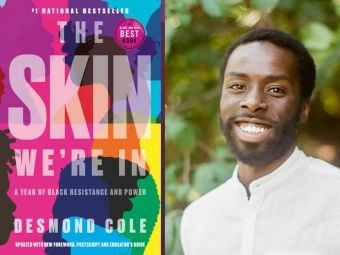Acadia students take anti-racism education beyond the classroom

The Acadia community is engaging in challenging but necessary conversations about anti-racism. A dialogue about anti-Black racism was kicked off on January 21 at the 2025 H.T. Reid Lecture, at which journalist and activist, Desmond Cole gave a lecture titled “The Shakedown: Local Policing in Canada.”
The lecture led students to reflect on their own relationship with policing, their understanding of policy, and the role they might play in activism.
Carol Scott (first year Political Science MA) said that Cole’s lecture connects well with her ongoing work at Acadia examining policy. It prompted her to think more deeply about how policy development can cause unintended effects.
“I think, as a student, one of the most important things I can do is to recognize biases within the system,” says Carol. “How do structures within academia affect marginalized groups? How is what I'm learning affected by systemic injustices?”
“As Desmond said, ‘Policy isn’t a slogan,’ and policy development is often complicated. It's worth taking the time to consider unintended effects and how policies are connected to systemic issues.”
Learning beyond the classroom
For Asja Dawson (third year, Law and Society), the lecture prompted her to think about how her Acadia education extends beyond the classroom.
“The lecture allowed me, and other students, to have the realization that ‘learning at a university’ doesn't necessarily only mean in class but using all opportunities to further your knowledge and understanding of complex issues.”
Mickey Russell (Human Rights Education and Response Advocate) wholeheartedly agrees. As part of their programming, the Equity Office runs a book club throughout the year. This February they are discussing Desmond Cole’s book, The Skin We’re In.
Mickey says that the book club allows students to engage in conversations about equity in a safer space where they can hear stories from other students’ lived experiences and gain new perspectives.
“Book club is a good way to absorb the materials, sit with it, talk about it, ask questions and gain a deeper understanding,” says Mickey.
“These things are part of education and training to be in the world,” explains Mickey. “Our discussions help you to become better people and allies as you go along through your education.”
Plus, Mickey adds, it’s also a lot of fun to participate.
“As students,” says Asja,” “we should be active in our learning whether that means through a textbook, or staying educated on issues that may be happening just down the street of the place we call home throughout our university experience.”
Join the conversation
Even though the February book club has already started, it’s not too late to join!
“You don’t have to read the book at all to come out and participate,” says Mickey. “However you show up is how we’re ready to receive you.”
Come on out to join in the conversation Wednesdays until March 5 at Perkins Café.
And stay tuned for future book club picks from the Equity Office. Next up they will be reading Robin Wall Kimmerer’s book, Braiding Sweetgrass.
